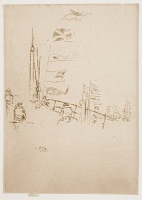Etchings Institutions search term: wunderlich
Bunting | ||
| Number: | 304 | |
| Date: | 1887 | |
| Medium: | etching and drypoint | |
| Size: | 178 x 127 mm | |
| Signed: | butterfly at lower left | |
| Inscribed: | no | |
| Set/Publication: | no | |
| No. of States: | 2 | |
| Known impressions: | 11 | |
| Catalogues: | K.324; M.318; W.241 | |
| Impressions taken from this plate (11) | ||
TECHNIQUE
Lightly etched, with even lighter drypoint corrections and additions in the second state, this is among Whistler's most freely drawn etchings, full of light and space. The lines are expressive - jerky, wriggly, broken - and the scene is vignetted, reduced to a few evocative elements.
PRINTING
The record of printing of the 'Naval Review Set' is very full but not entirely clear. Whistler kept the first impression of Bunting, marking it '1st - Proof -' ( ). The lists suggest that five impressions of Bunting were printed by 19 August 1887, four on 20 August and six on 26 August. The same list records eleven on 1 September; however, this may be a record of prints in stock. A print-run of around fifteen is more likely. A note adds that eleven were still in stock on 26 September. 7
). The lists suggest that five impressions of Bunting were printed by 19 August 1887, four on 20 August and six on 26 August. The same list records eleven on 1 September; however, this may be a record of prints in stock. A print-run of around fifteen is more likely. A note adds that eleven were still in stock on 26 September. 7
 ). The lists suggest that five impressions of Bunting were printed by 19 August 1887, four on 20 August and six on 26 August. The same list records eleven on 1 September; however, this may be a record of prints in stock. A print-run of around fifteen is more likely. A note adds that eleven were still in stock on 26 September. 7
). The lists suggest that five impressions of Bunting were printed by 19 August 1887, four on 20 August and six on 26 August. The same list records eleven on 1 September; however, this may be a record of prints in stock. A print-run of around fifteen is more likely. A note adds that eleven were still in stock on 26 September. 7
7: [18 August- 1 September 1887], GUW #13234.
The first proof was printed in black ink on ivory laid paper ( ), followed by impressions in black on cream laid 'Pro Patria' paper (
), followed by impressions in black on cream laid 'Pro Patria' paper ( ); greenish black on cream laid (
); greenish black on cream laid ( ); and black on ivory laid paper (
); and black on ivory laid paper ( ,
,  ). In addition several impressions are in dark brown ink, on ivory (
). In addition several impressions are in dark brown ink, on ivory ( ,
,  ) and cream (
) and cream ( ) laid paper; on medium-weight 'antique' (pre-1800) laid (
) laid paper; on medium-weight 'antique' (pre-1800) laid ( ,
,  ) and similar 'antique' paper with the Arms of Amsterdam watermark (
) and similar 'antique' paper with the Arms of Amsterdam watermark ( ).
).
 ), followed by impressions in black on cream laid 'Pro Patria' paper (
), followed by impressions in black on cream laid 'Pro Patria' paper ( ); greenish black on cream laid (
); greenish black on cream laid ( ); and black on ivory laid paper (
); and black on ivory laid paper ( ,
,  ). In addition several impressions are in dark brown ink, on ivory (
). In addition several impressions are in dark brown ink, on ivory ( ,
,  ) and cream (
) and cream ( ) laid paper; on medium-weight 'antique' (pre-1800) laid (
) laid paper; on medium-weight 'antique' (pre-1800) laid ( ,
,  ) and similar 'antique' paper with the Arms of Amsterdam watermark (
) and similar 'antique' paper with the Arms of Amsterdam watermark ( ).
). All but one are trimmed to the platemark and signed on the tab with a butterfly and 'imp.' to show that Whistler printed them; in the sole exception, the tab must have been cut off by mistake, and it is signed on the verso. There is light surface tone, sensitively wiped and graduated, on most impressions (i.e. ,
,  ).
).
 ,
,  ).
).
